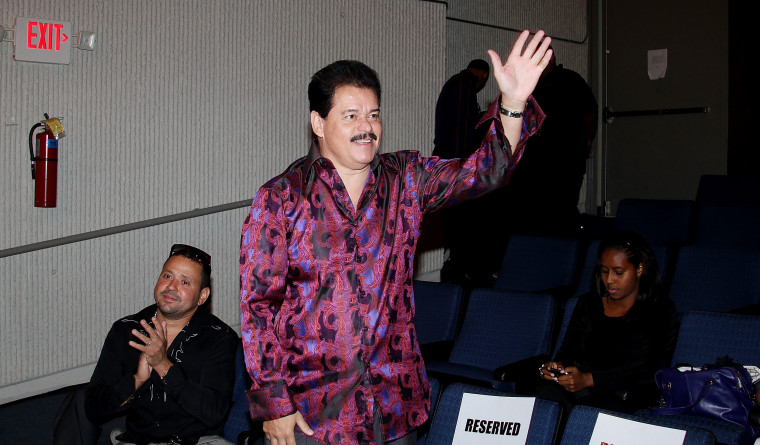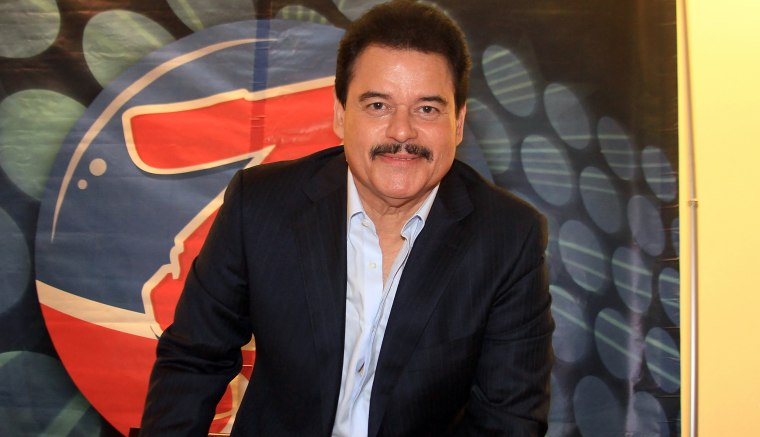Puerto Rican singer and musician Lalo Rodríguez, best known for his salsa megahit “Ven devórame otra vez“ (Come devour me again) has died.
His body was found in the parking lot of a public housing project in his hometown of Carolina, Puerto Rico, on Dec. 13, police said. He was 64.
The cause of death remained unknown as of Dec. 14. Puerto Rico’s Institute of Forensic Sciences is expected to certify his cause of death following an autopsy.
As fellow musicians and fans grapple with the uncertain circumstances surrounding his death, they’re remembering Rodríguez as a talented artist who helped lift salsa music to new heights.
“One of the most beautiful voices my ears have heard and will hear. His unique, tuned and potent timbre made his music immortal,” Puerto Rican merengue singer Elvis Crespo, known for his international hit “Suavemente,” tweeted in Spanish. “My sincere condolences to his family and fans. May our Lalo Rodríguez rest in peace.”
According to preliminary information, authorities received a 911 call alerting them about the body on Tuesday. An acquaintance of Rodríguez later arrived at the scene to identify the body. Rodríguez has for years struggled with addiction to drugs and alcohol.
“Lalo fought against the vice monster. Unfortunately, drugs rarely lose. Light and progress Lalo,” salsa music icon Willie Colón, who is also credited for helping popularize the genre, lamented in Spanish on Twitter.
The artist, born Ubaldo Rodríguez Santos, started his music career when he was just a teenager. From ages 12 to 15 he was part of the salsa band Tempo Moderno.

Rodríguez’s undeniable talent as a vocalist earned him the title of “El Canario de Carolina” (The Canary from Carolina) early on this career.
In 1973, when he was only 16, Rodríguez sang in “The Sun of Latin Music,” a pivotal album from Latin Jazz legend and pianist Eddie Palmieri.
The album became the first Latin production to win a Grammy Award. With songs like “Nada de ti” (Nothing of you), “Nunca contigo” (Never with you), “Un día bonito” (A beautiful day) and “Deseo salvaje” (Wild desire), a bolero written by Rodríguez, the album left a mark in the history of Latin music.
Palmieri, 85, lamented Rodríguez’s death “with deep sadness.“
“I don’t need to tell you how much our music and culture has meant to me and to the world,” Palmieri said in Spanish on Twitter. “He was a giant in so many ways. We will miss him dearly and treasure his memory.”
Rodríguez eventually went solo. He wrote five songs for his 1980 album “Simplemente Lalo.” Some of the most memorable songs from his solo debut album are “Máximo Chamorro,” “Francisco Andante,” “Tu no sabes querer” (You don’t know how to love), “Las mujeres” (The women) and “Tristeza encantada” (Enchanted sadness).
“All those songs became hits. In Venezuela, Colombia… Everywhere,” Frank Ferrer, who produced the album for Tierrazo Records, told Puerto Rico’s National Foundation for Popular Culture following Rodríguez’s passing. “He had a hard, difficult life and I am very sad for his departure.”
Ferrer, 76, remembered Rodríguez as “one of the greatest talents I have ever met.”
“He had it all, he was elegant, had presence, personality and talent,” Ferrer said.
‘First vocalist of the genre to win a Grammy’
In 1988, Rodríguez established himself as a top exponent of romantic salsa with his hit “Ven devórame otra vez“ from his chart-topping album “Un Nuevo Despertar” (A New Awakening) for Rodven Records.
“I made it internationally with that song,” Rodríguez told Latino entertainment journalist Tony Dandrades in 2007.
When asked if another hit such as “Ven devórame otra vez“ could ever exist again, Rodríguez told Dandrades, “Nothing is impossible.”
“But, repeat it, no,” Rodríguez said in Spanish. “Because times change, it could be even bigger.”
Salsa music enthusiast Juana Peña described Rodríguez as a “versatile singer, capable of getting into any rhythm and doing it well” in a tweet.
“He started singing classical salsa and became the first vocalist of the genre to win a Grammy. He later dabbled in romantic salsa and established himself as an idol with this song,” Peña said in Spanish, in reference to “Ven devórame otra vez.”
Puerto Rican writer Sandra Guzmán mourned the singer’s passing with a touching post saying, “A virtuoso goes to music heaven to join Puerto Rican salsa Gods. RIP #LaloRodriguez.”
This story originally appeared on NBCNews.com.
